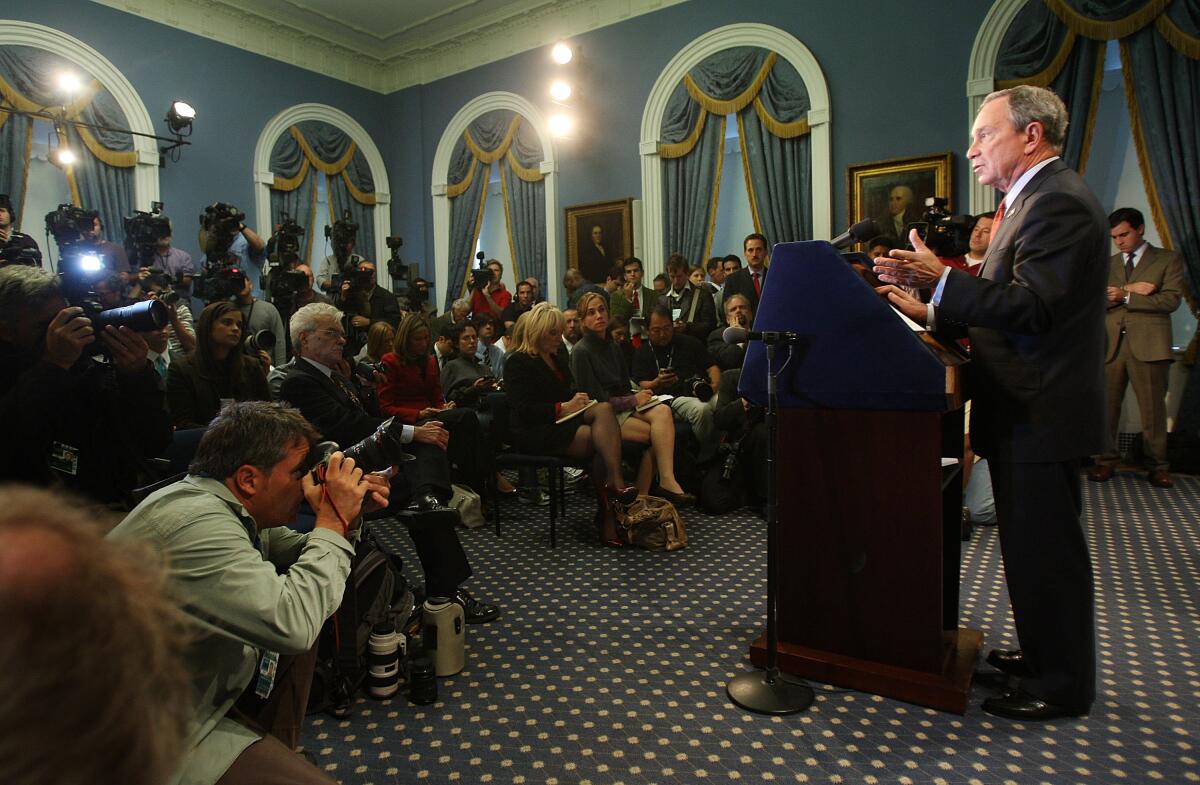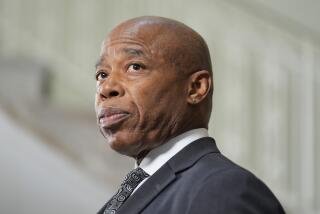Michael Bloomberg is running for president as an underdog billionaire — with or without the support of New York City

NEW YORK — Michael R. Bloomberg sat stone-faced behind an ornate desk at City Hall, as speaker after speaker berated him for four and a half hours.
“I may not be able to vote yet, but I know for a fact that what you are doing is wrong,” a 14-year-old from Brooklyn told him. “Quite frankly, Mayor Bloomberg, you are cheating.”
It was Nov. 3, 2008, the day before Barack Obama was elected president. The economy was in a deep recession. Bloomberg’s second term was near its end, and, against the advice of some of his closest advisors, he had strong-armed a divided City Council to extend a two-term limit that had been imposed by voters, so that he could run again. New York, he declared, needed him.
Before he could sign that extension into law, he had to endure days of withering face-to-face criticism from New Yorkers who accused him of hypocritically circumventing democracy. Bloomberg also paid a price: In 2009, he barely squeaked to a third term over a fairly weak opponent. And that was after spending $100 million of his own money.
It was audacious, humbling and ultimately successful. Bloomberg now hopes to parlay his largely successful tenure as mayor of the nation’s most populous city, along with his heavy spending on progressive causes like curbing gun violence and mitigating climate change, into a successful bid for the Democratic nomination for president.
Bloomberg’s strategists are modeling their effort on his longshot race for mayor in 2001. He was initially dismissed as yet another rich person indulging with politics as a hobby. Bloomberg turned that perception around by spending generously on direct mail and TV ads. He also convinced voters that his Wall Street experience and entrepreneurial ability were assets. The uncertainties of the 9/11 attacks, Bloomberg’s enormous spending and a last-minute endorsement from the incumbent mayor, Rudolph W. Giuliani, helped push him over the line.
Michael R. Bloomberg, one of the richest men in the world, enters the race with a huge financial edge over his Democratic rivals — but also with big vulnerabilities.
Bloomberg used about $74 million of his fortune for his race in 2001, $85 million in 2005 and $102 million in 2009. With a net worth estimated at $54 billion, he can easily burn through multiple times the $1.6 billion that Donald Trump, Hillary Clinton and their allies spent in total during the 2016 presidential campaign. Since he announced his candidacy on Nov. 24, Bloomberg has spent more than $60 million advertising on TV, cable and social media, according to Advertising Analytics, an ad tracking firm.
Still, even his admirers acknowledge that winning a national Democratic primary will be a uphill battle. Bloomberg is a billionaire seeking favor among Democratic voters who are deeply worried about inequality in income and wealth. His commitment to the party is tenuous: A longtime Democrat, he became a Republican so he could face a less-competitive primary when he ran for mayor in 2001, and then declared himself an independent in 2007 before returning to the Democratic Party last year.
Moreover, no New York City mayor has ever been a major-party nominee for president, though several — John V. Lindsay in 1972, Giuliani in 2008 and the current mayor, Bill de Blasio, this year — have tried.
Having thrice decided against running for president — in 2008, 2016 and most recently in March — Bloomberg changed his mind in November, when surveys conducted by his and other pollsters showed President Trump with a strong chance of winning six swing states that could likely decide the 2020 election.
Bloomberg entered the race too late to take part in the New Hampshire primary, and he is skipping the caucuses in Iowa, where his rivals have been campaigning for the last year. Instead he is placing his bets on Super Tuesday, hoping that a blizzard of TV and internet ads will sway Democratic voters in 14 states, including California and Texas, that will vote on March 3.
“I think that at age 77 he decided it was his last chance to get in to make his pitch, and to defeat Donald Trump,” said Eleanor Randolph, a veteran journalist whose largely sympathetic biography, “The Many Lives of Michael Bloomberg,” was published in September.
“He has told friends that he will reassess his position after Super Tuesday,” she said. “By then, if there’s no candidate, who knows? Seat belts, anyone?”
During Bloomberg’s mayoralty, from 2002 to 2013, New York changed in ways that were hard to miss. Nearly 40% of the city was rezoned; bike lanes and parks opened; skyscrapers sprouted; and Lower Manhattan emerged from the ashes of 9/11 as a vibrant residential neighborhood. The city became safer and more prosperous. Tourists descended in record numbers. Gentrification transformed sections of the city; Brooklyn came to rival Manhattan as measured by food, amenities and cost of housing. Bans on smoking indoors and in parks, and on trans fats in restaurants, made New Yorkers healthier.
But Bloomberg’s record has also come under harsher scrutiny since he left office. Steep increases in the cost of housing have squeezed the middle class. While race relations improved, the Police Department’s use of stop-and-frisk tactics disproportionately affected black and Hispanic residents, and was deemed unconstitutional. The city’s public schools, which the state put under the mayor’s control during Bloomberg’s first term, remain uneven. Public housing deteriorated under Bloomberg’s watch; poverty rose; and the city’s jail, Rikers Island, became a byword for chaos and violence. (The city is trying to shut it down.)
Recent interviews with a dozen longtime players in New York City politics revealed a profound ambivalence. Even those who respect his record thought it would be hard for a Jewish billionaire to be embraced in pivotal states like Ohio and Wisconsin — or even in liberal states like California, where voters seem skeptical or indifferent toward Bloomberg.
At the time of the term-limits debate, Letitia James was a Brooklyn councilwoman who fiercely opposed Bloomberg on issues such as policing and housing. James was later elected the city’s public advocate, and this year took office as the state’s attorney general.
“Right now we are facing some major challenges to our democracy,” said James, who has remained neutral in the presidential nominating fight. “I would like a candidate who can return our country to normalcy.”
Asked if she could see supporting Bloomberg, she replied: “I’m not there yet.”
John C. Liu, a state senator from Queens, who as a councilman and as city comptroller often clashed with Bloomberg, agreed. “Anybody-but-Trump is a pretty strong motivation,” he said. “Bloomberg would be far preferable to the guy in the Oval Office right now. The question is not whether he can win the swing states. The question is whether he can prevail in the primary.”
Those who have worked for Bloomberg describe a meticulous and steady manager, with outsize ambitions and little interest in process or horse-trading.
“Mike is an optimist, but he’s a contrarian; he’s also extremely practical,” said Daniel L. Doctoroff, who was Bloomberg’s deputy mayor for economic development from 2002 to 2008, and then led Bloomberg’s privately held company.
Bloomberg did not expect to become mayor in 2001, Doctoroff said. But, he added, “The mistake no one should ever make is to underestimate Mike Bloomberg.”
Stephen Goldsmith, a Republican former mayor of Indianapolis who now teaches at Harvard, served as a deputy mayor for operations during Bloomberg’s third term. He said he did not think Bloomberg had entered the race out of vanity.
“I think he’s legitimately concerned about the country,” Goldsmith said.
In a 2017 biography of Bloomberg, Chris McNickle, a historian who lives in the Bronx, said the term limits debate was a low point for Bloomberg, but also proof of the billionaire’s tenacity.
“He was seen by a significant minority of New Yorkers as willing to bend democratic norms to suit his personal ambitions in an arrogant manner,” McNickle said in an interview. “Yet there is little evidence that it had an impact on his effectiveness.”
More to Read
Get the L.A. Times Politics newsletter
Deeply reported insights into legislation, politics and policy from Sacramento, Washington and beyond. In your inbox three times per week.
You may occasionally receive promotional content from the Los Angeles Times.











